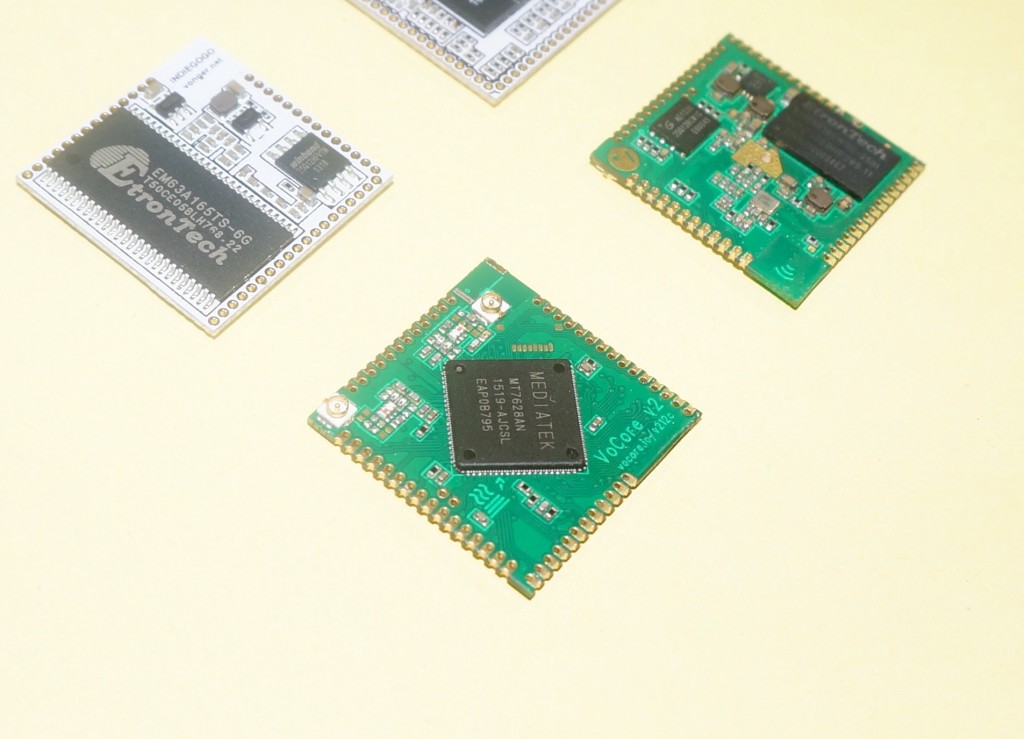Now uboot part works, we need to make openwrt serial also output to UART2.
PS: weird issue, I find /dev/mem gone…is Linux 4.4.6 removed it?
My code based on trunk@49094. It is a develop openwrt version also contains many bugs. 🙂 If my code works please help me commit to openwrt.
If we do not modify anything, just flash uboot firmware to VoCore2, the serial log will end here.
U-Boot 1.1.3 (Mar 28 2016 - 22:54:05)
Board: Ralink APSoC DRAM: 64 MB
relocate_code Pointer at: 83fb8000
******************************
Software System Reset Occurred
******************************
flash manufacture id: c8, device id 40 18
find flash: GD25Q128C
*** Warning - bad CRC, using default environment
============================================
Ralink UBoot Version: 4.3.0.0
--------------------------------------------
ASIC 7628_MP (Port5<->None)
DRAM component: 512 Mbits DDR, width 16
DRAM bus: 16 bit
Total memory: 64 MBytes
Flash component: SPI Flash
Date:Mar 28 2016 Time:22:54:05
============================================
icache: sets:512, ways:4, linesz:32 ,total:65536
dcache: sets:256, ways:4, linesz:32 ,total:32768
##### The CPU freq = 575 MHZ ####
estimate memory size =64 Mbytes
RESET MT7628 PHY!!!!!!
Please choose the operation:
1: Load system code to SDRAM via TFTP.
2: Load system code then write to Flash via TFTP.
3: Boot system code via Flash (default).
4: Entr boot command line interface.
7: Load Boot Loader code then write to Flash via Serial.
9: Load Boot Loader code then write to Flash via TFTP.
0
3: System Boot system code via Flash.
## Booting image at bc050000 ...
Image Name: MIPS OpenWrt Linux-4.4.6
Image Type: MIPS Linux Kernel Image (lzma compressed)
Data Size: 1270118 Bytes = 1.2 MB
Load Address: 80000000
Entry Point: 80000000
Verifying Checksum ... OK
Uncompressing Kernel Image ... OK
No initrd
## Transferring control to Linux (at address 80000000) ...
## Giving linux memsize in MB, 64
Starting kernel ...
[ 0.000000] Linux version 4.4.6 (vocore@ubuntu) (gcc version 5.3.0 (OpenWrt GCC 5.3.0 r49094) ) #7 Fri Apr 1 18:35:11 UTC 2016
[ 0.000000] Board has DDR2
[ 0.000000] Analog PMU set to hw control
[ 0.000000] Digital PMU set to hw control
[ 0.000000] SoC Type: MediaTek MT7628AN ver:1 eco:2
[ 0.000000] bootconsole [early0] enabled
[ 0.000000] CPU0 revision is: 00019655 (MIPS 24KEc)
[ 0.000000] MIPS: machine is VoCore2 64MB
[ 0.000000] Determined physical RAM map:
[ 0.000000] memory: 04000000 @ 00000000 (usable)
[ 0.000000] Initrd not found or empty - disabling initrd
[ 0.000000] Zone ranges:
[ 0.000000] Normal [mem 0x0000000000000000-0x0000000003ffffff]
[ 0.000000] Movable zone start for each node
[ 0.000000] Early memory node ranges
[ 0.000000] node 0: [mem 0x0000000000000000-0x0000000003ffffff]
[ 0.000000] Initmem setup node 0 [mem 0x0000000000000000-0x0000000003ffffff]
[ 0.000000] Primary instruction cache 64kB, VIPT, 4-way, linesize 32 bytes.
[ 0.000000] Primary data cache 32kB, 4-way, PIPT, no aliases, linesize 32 bytes
[ 0.000000] Built 1 zonelists in Zone order, mobility grouping on. Total pages: 16256
[ 0.000000] Kernel command line: console=ttyS0,57600 rootfstype=squashfs,jffs2
[ 0.000000] PID hash table entries: 256 (order: -2, 1024 bytes)
[ 0.000000] Dentry cache hash table entries: 8192 (order: 3, 32768 bytes)
[ 0.000000] Inode-cache hash table entries: 4096 (order: 2, 16384 bytes)
[ 0.000000] Writing ErrCtl register=00073670
[ 0.000000] Readback ErrCtl register=00073670
[ 0.000000] Memory: 60844K/65536K available (2859K kernel code, 132K rwdata, 692K rodata, 148K init, 195K bss, 4692K reserved, 0K cma-reserved)
[ 0.000000] SLUB: HWalign=32, Order=0-3, MinObjects=0, CPUs=1, Nodes=1
[ 0.000000] NR_IRQS:256
[ 0.000000] intc: using register map from devicetree
[ 0.000000] add clock for 10000d00.uart1, rate = 40000000
[ 0.000000] add clock for 10000e00.uart2, rate = 40000000
[ 0.000000] add clock for cpu, rate = 580000000
[ 0.000000] add clock for 10000100.timer, rate = 40000000
[ 0.000000] add clock for 10000120.watchdog, rate = 40000000
[ 0.000000] add clock for 10000b00.spi, rate = 193333333
[ 0.000000] add clock for 10000b40.spi, rate = 193333333
[ 0.000000] add clock for 10000c00.uartlite, rate = 40000000
[ 0.000000] add clock for 10180000.wmac, rate = 40000000
[ 0.000000] CPU Clock: 580MHz
[ 0.000000] clocksource_probe: no matching clocksources found
[ 0.000000] clocksource: MIPS: mask: 0xffffffff max_cycles: 0xffffffff, max_idle_ns: 6590553264 ns
[ 0.000011] sched_clock: 32 bits at 290MHz, resolution 3ns, wraps every 7405115902ns
[ 0.015349] Calibrating delay loop... 385.84 BogoMIPS (lpj=1929216)
[ 0.080520] pid_max: default: 32768 minimum: 301
[ 0.089782] Mount-cache hash table entries: 1024 (order: 0, 4096 bytes)
[ 0.102736] Mountpoint-cache hash table entries: 1024 (order: 0, 4096 bytes)
[ 0.122279] clocksource: jiffies: mask: 0xffffffff max_cycles: 0xffffffff, max_idle_ns: 19112604462750000 ns
[ 0.141778] pinctrl core: initialized pinctrl subsystem
[ 0.152723] NET: Registered protocol family 16
[ 0.179323] mt7621_gpio 10000600.gpio: registering 32 gpios
[ 0.190412] mt7621_gpio 10000600.gpio: registering 32 gpios
[ 0.201416] mt7621_gpio 10000600.gpio: registering 32 gpios
[ 0.213941] clocksource: Switched to clocksource MIPS
[ 0.225338] NET: Registered protocol family 2
[ 0.234765] TCP established hash table entries: 1024 (order: 0, 4096 bytes)
[ 0.248470] TCP bind hash table entries: 1024 (order: 0, 4096 bytes)
[ 0.260983] TCP: Hash tables configured (established 1024 bind 1024)
[ 0.273632] UDP hash table entries: 256 (order: 0, 4096 bytes)
[ 0.285086] UDP-Lite hash table entries: 256 (order: 0, 4096 bytes)
[ 0.297732] NET: Registered protocol family 1
[ 0.307657] futex hash table entries: 256 (order: -1, 3072 bytes)
[ 0.338516] squashfs: version 4.0 (2009/01/31) Phillip Lougher
[ 0.349983] jffs2: version 2.2 (NAND) (SUMMARY) (LZMA) (RTIME) (CMODE_PRIORITY) (c) 2001-2006 Red Hat, Inc.
[ 0.372014] io scheduler noop registered
[ 0.379693] io scheduler deadline registered (default)
[ 0.390672] Serial: 8250/16550 driver, 2 ports, IRQ sharing disabled
[ 0.404112] rt2880-pinmux pinctrl: invalid group "spis" for function "pwm"
[ 0.417827] console [ttyS0] disabled
[ 0.424820] 10000e00.uart2: ttyS0 at MMIO 0x10000e00 (irq = 30, base_baud = 2500000) is a 16550A
[ 0.442151] console [ttyS0] enabled
[ 0.442151] console [ttyS0] enabled
[ 0.455889] bootconsole [early0] disabled
[ 0.455889] bootconsole [early0] disabled
[ 0.473336] spi-mt7621 10000b00.spi: sys_freq: 193333333
[ 0.487529] m25p80 spi32766.0: using chunked io (size=32)
[ 0.498290] m25p80 spi32766.0: gd25q128 (16384 Kbytes)
[ 0.508501] 4 ofpart partitions found on MTD device spi32766.0
[ 0.520053] Creating 4 MTD partitions on "spi32766.0":
[ 0.530233] 0x000000000000-0x000000030000 : "u-boot"
[ 0.541846] 0x000000030000-0x000000040000 : "u-boot-env"
[ 0.554307] 0x000000040000-0x000000050000 : "factory"
[ 0.566168] 0x000000050000-0x000000800000 : "firmware"
[ 0.603038] 2 uimage-fw partitions found on MTD device firmware
[ 0.614797] 0x000000050000-0x0000001861a6 : "kernel"
[ 0.626261] 0x0000001861a6-0x000000800000 : "rootfs"
[ 0.637985] mtd: device 5 (rootfs) set to be root filesystem
[ 0.649351] 1 squashfs-split partitions found on MTD device rootfs
[ 0.661606] 0x000000370000-0x000000800000 : "rootfs_data"
[ 0.683669] rt3050-esw 10110000.esw: link changed 0x00
[ 0.695347] mtk_soc_eth 10100000.ethernet: generated random MAC address fe:67:bf:04:9d:38
[ 0.712449] mtk_soc_eth 10100000.ethernet eth0: mediatek frame engine at 0xb0100000, irq 5
[ 0.729378] mt7621_wdt 10000120.watchdog: Initialized
[ 0.740958] NET: Registered protocol family 10
[ 0.753409] NET: Registered protocol family 17
[ 0.762371] bridge: automatic filtering via arp/ip/ip6tables has been deprecated. Update your scripts to load br_netfilter if you need this.
[ 0.787379] 8021q: 802.1Q VLAN Support v1.8
Now my fix( as dirty as always 😀 )
1. modify MIWIFI-NANO.dts(I did not create new VoCore2.dts to make test easier)
+++ b/target/linux/ramips/dts/MIWIFI-NANO.dts
@@ -3,11 +3,11 @@
/include/ "mt7628an.dtsi"
/ {
- compatible = "xiaomi,MiWifi Nano", "mediatek,mt7628an-soc";
- model = "MiWiFi Nano";
+ compatible = "vocore2,vocore", "mediatek,mt7628an-soc";
+ model = "VoCore2 64MB";
chosen {
- bootargs = "console=ttyS0,115200";
+ bootargs = "console=ttyS0,57600";
};
memory@0 {
@@ -18,7 +18,7 @@
pinctrl {
state_default: pinctrl0 {
gpio {
- ralink,group = "refclk", "wled", "gpio";
+ ralink,group = "refclk", "gpio";
ralink,function = "gpio";
};
};
@@ -87,5 +87,13 @@
};
};
};
+
+ uart2@e00 {
+ status = "okay";
+ };
+
+ pwm@5000 {
+ status = "okay";
+ };
};
};
diff --git a/target/linux/ramips/dts/mt7628an.dtsi b/target/linux/ramips/dts/mt7628an.dtsi
index e120e56..819ac82 100644
--- a/target/linux/ramips/dts/mt7628an.dtsi
+++ b/target/linux/ramips/dts/mt7628an.dtsi
@@ -170,6 +170,8 @@
pinctrl-names = "default";
pinctrl-0 = <&uart0_pins>;
+
+ status = "disabled";
};
uart1@d00 {
@@ -301,8 +303,8 @@
uart2_pins: uart2 {
uart2 {
- ralink,group = "uart2";
- ralink,function = "uart2";
+ ralink,group = "spis";
+ ralink,function = "pwm";
};
};
2. modify /linux-4.4.6/arch/mips/ralink/mt7620.c:407
ralink_clk_add("10000d00.uartlite", periph_rate);
ralink_clk_add("10000e00.uartlite", periph_rate);
change to
ralink_clk_add("10000d00.uart1", periph_rate);
ralink_clk_add("10000e00.uart2", periph_rate);
This just works, but I do not think it is the best way. We should use ttyS2 in dts, but not ttyS0. I still need time to understand how pinctrl works. 🙂








